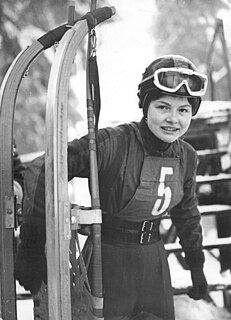
The Ministry for State Security, or State Security Service, commonly known as the Stasi, was the official state security service of the German Democratic Republic from 1950 to 1990. It has been described as one of the most effective and repressive intelligence and secret police agencies to have ever existed.

Margot Honecker was an East German politician who was an influential member of that country's Communist government until 1989. From 1963 until 1989, she was Minister of National Education of the GDR. She was married to Erich Honecker, the leader of East Germany's ruling Socialist Unity Party from 1971 to 1989 and concurrently from 1976 to 1989 the country's head of state.
Irina Müller is a German rower, who won the gold medal at the 1976 Summer Olympics and was a member of the SG Dynamo Potsdam.

Hannelore Anke is a retired German swimmer who competed for East Germany in the 1970s.

Thomas Brasch was a German author, poet and film director.

Jürgen Nöldner is a German former footballer who was active in East Germany. He is the son of Erwin Nöldner, a resistance fighter killed by the Nazis in 1944.
Gabriele "Gabi" Kühn is a German rower who competed for East Germany in the 1976 Summer Olympics and in the 1980 Summer Olympics.
Bernd Hartstein was a German sport shooter and trainer. In 1980, he won the Olympic silver medal in small-bore rifle, three positions, for East Germany

Ortrun Zöphel-Enderlein is a former East German (GDR) luger, and one of the most successful lugers in the 1960s. Enderlein started her working career at the SC Traktor Oberwiesenthal, and was first introduced to luge in her home village of Raschau in the Ore Mountains. In the 1964 Winter Olympic Games in Innsbruck, she became the first female luger to win gold at the Olympics. and won the World Cup in 1965 in Davos and 1967 in Hammarstrand. The athletic achievements of the lugers Thomas Köhler and Enderlein were celebrated and politicised in the GDR during the Cold War when the GDR was not recognised by West Germany, and athletic events in either part of Germany with athletes from both countries were not permitted because of the Hallstein Doctrine.

Helmut Müller-Enbergs is a German political scientist who has written extensively on the Stasi and related aspects of the German Democratic Republic's history.
An unofficial collaborator or IM, or euphemistically informal collaborator, was an informant in the German Democratic Republic who delivered private information to the Ministry for State Security. At the end of the East German government, there was a network of around 189,000 informants, working at every level of society.
Manfred Döring is a former Major general (Generalmajor) with the East German Ministry for State Security (Stasi). He also served, between 1987 and 1990, as a commander of the elite motorised rifles regiment, the Felix Dzerzhinsky Guards.
Ehrhart Neubert is a retired German Evangelical minister and theologian.

Horst Pehnert was an East German journalist and party official who in 1976 became a long-standing deputy Minister for Culture - effectively the minister for film and cinema.
Bernhard Elsner was a Major general in the East German Ministry for State Security (Stasi). During the course of a long career with the quasi-military ministry, between 1972 and 1987 he was Commander of the Felix Dzerzhinsky Guards Regiment.
Katja Havemann is a German civil rights activist and author.

Stefan Wolle is a German historian. A focus of his socio-historical research is on the German Democratic Republic which is where, before reunification, he lived and worked.
Jutta Braband is a former German politician. In the German Democratic Republic she was a civil rights activist who after 1990 became a PDS member of the Germany parliament (Bundestag). Her parliamentary career ended in May 1992 after it had become known that fifteen years earlier she had worked for the Ministry for State Security (Stasi) as a registered informant .
Heinz Kahlau was a German writer.

Christa Luft is a German economist and politician of the SED/PDS. Luft joined the SED in 1958. From 18 November 1989 to 18 March 1990 she was economy minister in the Modrow government. From 1994 to 2002 she was member of the Bundestag for the PDS.










